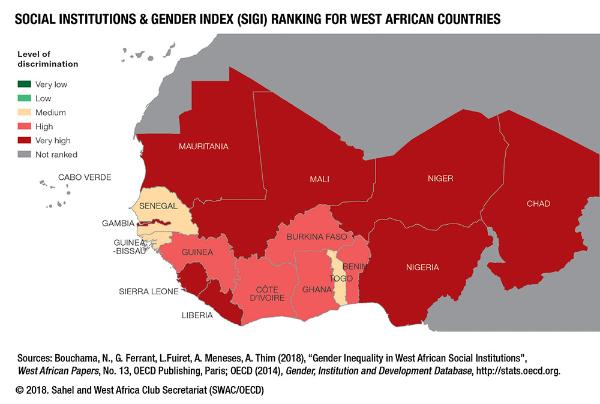Tackling discriminatory social norms would benefit West African economies, says new OECD study
On 8 March, International Women’s Day, the OECD Sahel and West Africa Club Secretariat in collaboration with the OECD Development Centre will launch a report on the impact of social norms on West African economies.
Discriminatory social institutions hinder socioeconomic performance and development outcomes. Although West African governments have taken important steps towards narrowing gender gaps, more needs to be done to address gender discrimination embedded in legal frameworks, but also in social norms and practices such as early marriage and female genital mutilation (FGM).
The Social Institutions and Gender Index (SIGI) in West Africa looks at how formal and informal laws, social norms and practices restrict the access of women and girls to equal rights, justice, employment opportunities and resources across 17 West African countries. It also looks at how putting social norms change at the core of policy responses can favour gender equality and broaden development outcomes. The challenge for policymakers and citizens is to create an environment that enables change in social institutions and allows West African women and men to benefit equally from development opportunities and economic growth.
Key results from the report include:
- Gender discrimination in laws, attitudes and practices costs the West African region some USD 120 billion per year.
- Discriminatory social norms and practices, such as early marriage, exacerbate gender gaps and limit women’s ability to pursue education and seek employment. Despite signs that early marriage is declining in West Africa, its prevalence is double the world average of 13%, with 30% of girls aged 15-19 married, widowed or divorced.
- Harmful practices remain deeply embedded in social norms. Half of West African women are affected by female genital mutilation (FGM), with the highest rates in Guinea and Mali, where nine in ten women have been subjected to the practice. Three in four women in these areas believe that FGM should continue.
- Women continue to be denied land rights. They represent, on average, 43% of agricultural workers but only 8% of landowners in seven countries (Burkina Faso, Cabo Verde, Côte d’Ivoire, Gambia, Guinea, Mali and Senegal).
- Women’s political participation remains below the global average and progress is slow. Female parliamentary representation in West Africa increased from 13% in 2007 to almost 16% in 2017 with rates ranging from 43% in Senegal to 6% in Nigeria.

Putting gender equality at the centre of policies is a long-term investment that will bear high social and economic returns. Governments can effectively achieve gender equality and encourage women’s and girl’s empowerment by: implementing legal reforms; putting social norms change at the heart of gender policy and dialogue; recognising that equal access to education for women and girls is a basic human right and a fundamental step for building more inclusive, sustainable and prosperous societies; and strengthening the data and evidence-base on discriminatory social institutions.
|
About SIGI SIGI measures gender-based discrimination in social norms, practices and laws across 160 countries. It also offers regional analysis and country studies. It serves as a research, advocacy and evidence-based tool for policy makers and the development community. It is one of the ways that the OECD works with countries to help achieve the 2030 Agenda for Sustainable Development and, in particular, Sustainable Development Goal 5 on gender equality. The SIGI is an official data source for monitoring SDG 5.1.1. |
For further information or to obtain a copy of the report under embargo please contact: Lia Beyeler (Tel: +33 1 45 24 89 54; lia.beyeler@oecd.org)
More information:
- Report
- Social Institutions and Gender Index (SIGI)
- Sahel and West Africa Club
- OECD Development Centre’s work on gender issues
 |
 |
Related Documents

